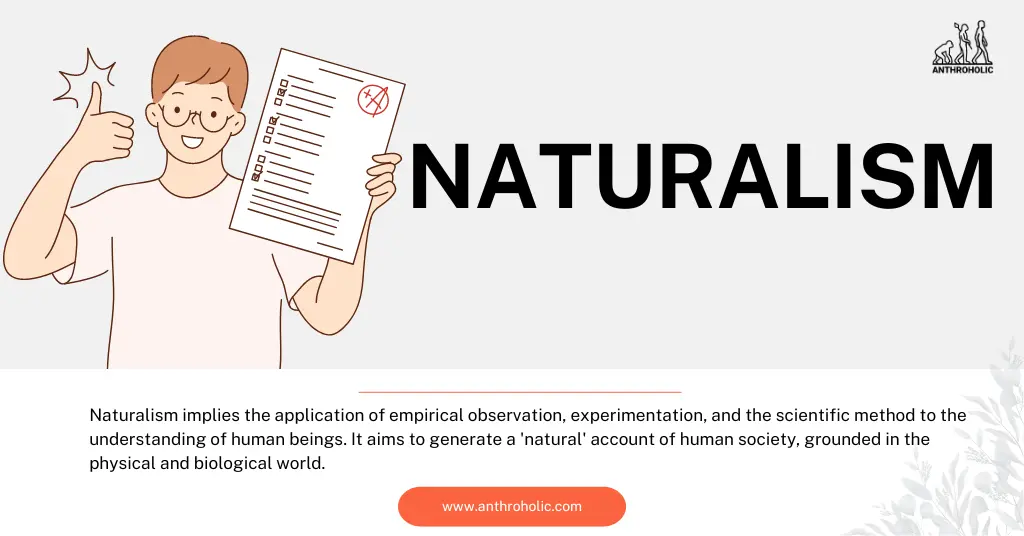AI Answer Evaluation Platform Live Now. Try Free Answer Evaluation Now
Naturalism
Naturalism, in the context of anthropological study, refers to an approach that seeks to understand human beings and their societies from an objective, scientific perspective. This approach, which emerged in the 19th century with the advent of anthropology as a distinct discipline, applies the principles and methodologies of the natural sciences to the study of human societies and cultures [1].

Defining Naturalism
Naturalism implies the application of empirical observation, experimentation, and the scientific method to the understanding of human beings. It aims to generate a ‘natural’ account of human society, grounded in the physical and biological world. The fundamental tenets of naturalism in anthropology include:
- Objectivity: Maintaining impartiality in observation and interpretation, thereby minimizing personal bias [2].
- Empiricism: Emphasizing observable facts and phenomena to derive conclusions.
- Rationality: Using logic and reason to interpret observed facts and derive theories.
- Reliability and validity: Ensuring the accuracy and generalizability of findings [3].
Naturalism in Practice
A practical manifestation of naturalism can be seen in the ethnographic fieldwork. The researcher observes a society or culture firsthand, often for extended periods, to gain a deep understanding of its functioning. Ethnographers frequently employ naturalistic techniques such as participant observation and unstructured interviews, which emphasize inductive reasoning and contextual understanding [4].
Participant Observation
In participant observation, the anthropologist becomes an active member of the group under study, sharing their daily life. The goal is to gain insights into the group’s social dynamics, cultural practices, and belief systems from an insider’s perspective.
Unstructured Interviews
Unstructured interviews are informal and open-ended. They allow the anthropologist to explore in-depth topics of interest and are guided by the participant’s responses rather than a predefined set of questions.
Impact of Naturalism
The impacts of naturalism in anthropology can be summarized in Table 1.
Table 1. Impact of Naturalism in Anthropology
| Impact | Description |
|---|---|
| Enhanced Understanding | A deeper, more nuanced understanding of human societies and cultures |
| Validation of Anthropology | Positioning anthropology as a credible scientific discipline, which was crucial for its institutionalization and growth |
| Contribution to Social Theory | Generation of new theories and concepts, enhancing our understanding of social and cultural phenomena |
| Ethical Implications | Fostered reflection on research ethics, given the immersive and often sensitive nature of ethnographic fieldwork |
Critiques of Naturalism
Naturalism has faced various critiques. It is argued that the desire for objectivity can lead to a detachment from subjects, impacting the depth of understanding. Critics also contend that naturalism’s focus on empiricism overlooks the role of interpretation in understanding human societies, and ignores the significance of human consciousness and subjectivity.
Conclusion
Despite critiques, naturalism remains an influential approach in anthropology, contributing significantly to our understanding of human societies and cultures. Through its commitment to empirical observation, objectivity, and scientific methodology, naturalism has played a vital role in the development and maturation of anthropology as a scientific discipline.
References
[1] Harris, M. (1968). The rise of anthropological theory: A history of theories of culture. New York: Thomas Y. Crowell.
[2] Lofland, J., & Lofland, L. H. (1995). Analyzing social settings. Wadsworth Publishing Company.
[3] Yin, R. K. (2009). Case study research: Design and methods. Sage Publications.
[4] Hammersley, M., & Atkinson, P. (2007). Ethnography: Principles in practice. London: Routledge.




